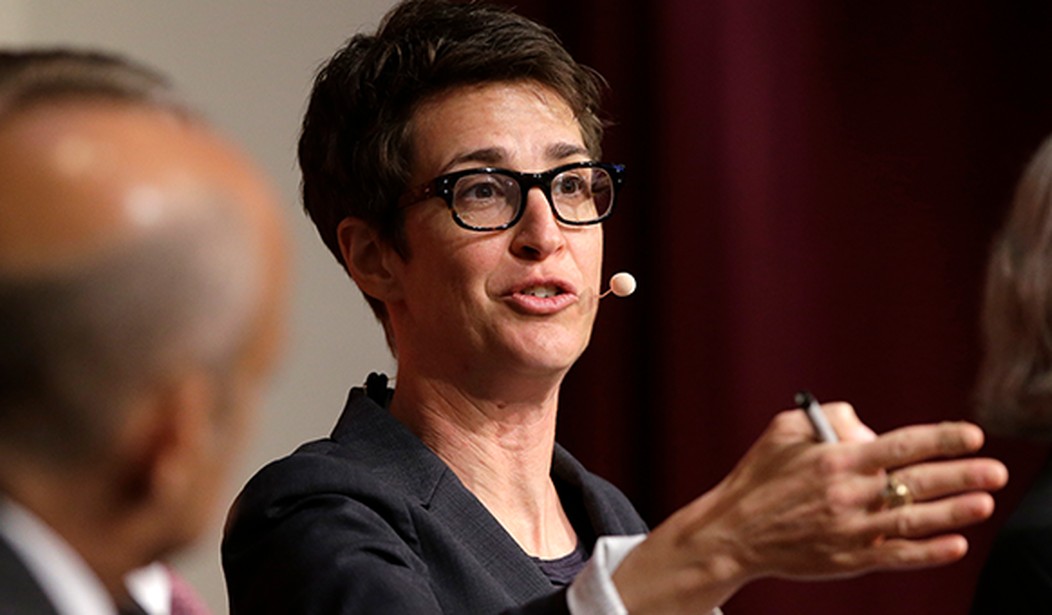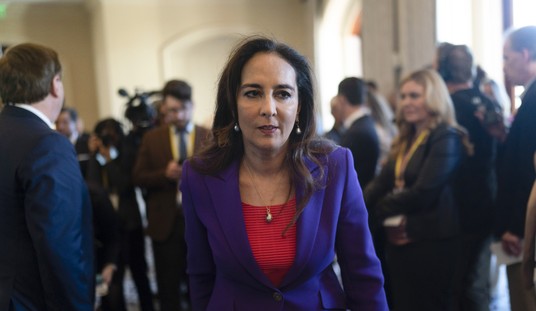I’ve never actually watched a full episode of Rachel Maddow’s show on MSNBC, but based on the clips I’ve seen, there’s no doubt that it is left-wing propaganda, not news.
And a federal judge apparently agrees with that.
Journalist Glenn Greenwald reports that an Obama-appointed judge ruled last month that “Maddow’s show is different than a typical news segment where anchors inform viewers about the daily news.”
Maddow does not keep her political views a secret, and therefore, audiences could expect her to use subjective language that comports with her political opinions.
Thus, Maddow’s show is different than a typical news segment where anchors inform viewers about the daily news. The point of Maddow’s show is for her to provide the news but also to offer her opinions as to that news.
While it’s amusing that we can now say a federal judge has ruled that Rachel Maddow’s show isn’t news, the ruling is actually not as amusing as you would think. The ruling was over a 2019 lawsuit from One America News (OAN), which sued Maddow, MSNBC, and its parent corporation, Comcast Corp., for defamation after Maddow claimed on the air, without evidence, that OAN, which she described as “the most obsequiously pro-Trump right-wing news outlet in America,” is “really literally…paid Russian propaganda.” Maddow was reporting on a Daily Beast article that noted an OAN reporter was a “Russian national” who also wrote freelance for the Russian-owned publication Sputnik.
The Obama-appointed judge Cynthia Bashant dismissed the defamation lawsuit on the grounds that Maddow’s audience knows she’s hyperpartisan, and thus, as Greenwald put it, that her audience “understands that her show consists of exaggeration, hyperbole, and pure opinion, and therefore would not assume that such outlandish accusations are factually true even when she uses the language of certainty and truth when presenting them (‘literally is paid Russian propaganda’).”
Recommended: Hunter Biden’s Art Exhibit Is So Fishy, Even OBAMA’s Ethics Chief Can’t Keep Silent
Bashant also ruled that Maddow’s viewers “expect” this of Maddow and watch her show “with the understanding that it will contain Maddow’s ‘personal and subjective views’ about the news.”
Here, Maddow had inserted her own colorful commentary into and throughout the segment, laughing, expressing her dismay (i.e., saying “I mean, what?”) and calling the segment a “sparkly story” and one we must “take in stride.” For her to exaggerate the facts and call OAN Russian propaganda was consistent with her tone up to that point, and the Court finds a reasonable viewer would not take the statement as factual given this context. The context of Maddow’s statement shows reasonable viewers would consider the contested statement to be her opinion. A reasonable viewer would not actually think OAN is paid Russian propaganda, instead, he or she would follow the facts of the Daily Beast article; that OAN and Sputnik share a reporter and both pay this reporter to write articles. Anything beyond this is Maddow’s opinion or her exaggeration of the facts.
Greenwald noted that a similar argument was used in the successful dismissal of a defamation lawsuit against Tucker Carlson and Fox News back in September—which the left exploited by claiming that “Fox admits that Carlson is a liar who cannot be believed!” Carlson had said that former model Karen McDougal “extorted” President Trump for wanting compensation in exchange for her silence about an alleged extramarital affair she claims she had with him.
“It is virtually impossible to find similar headlines about Maddow even though the judicial rationale justifying dismissal of the lawsuit against her was virtually identical to the one used in Carlson’s case,” notes Greenwald. “Indeed, lawyers for MSNBC and Fox cited most of the same legal precedent to defend their stars and to insist that their statements could not be actionable as defamation because viewers understood it as opinion rather than fact.”
However, Greenwald noted, “Indeed, it was Maddow’s statement — that OAN is ‘literally paid Russian propaganda’— that seems far more actionable than Carlson’s obviously figurative assertion that McDougal was ‘extorting’ Trump.”
Falsely accusing people of being paid Kremlin agents has a long and ugly history in the U.S., having destroyed reputations and careers, yet this smear has once again become utterly commonplace in Democratic Party politics (a protracted and ugly feud among liberal commentators was initiated earlier this month when The Young Turks’ Cenk Uygur baselessly and falsely claimed that journalist Aaron Maté was “paid by the Russians”).
But whatever else is true, those who want to claim that this court ruling proves Carlson is a lying propagandist who cannot be trusted have no way out of applying the same claim to Maddow. In both cases, it would be unfair and irrational to use these court rulings to suggest that, given that the arguments made were standard ones lawyers advance to defend a defamation defendant.
I think it’s safe to say that Tucker Carlson describing McDougal’s actions as extortion isn’t nearly the same as Maddow saying OAN is “literally” “paid Russian propaganda.” Maddow’s words, in my opinion, carried the weight of a factual claim to her audience.
So, while I agree with the judge ruling that Rachel Maddow isn’t news, this explanation was used to protect Maddow, MSNBC, and Comcast from a legitimate defamation claim. So, in that respect, the ruling was quite awful.










Join the conversation as a VIP Member